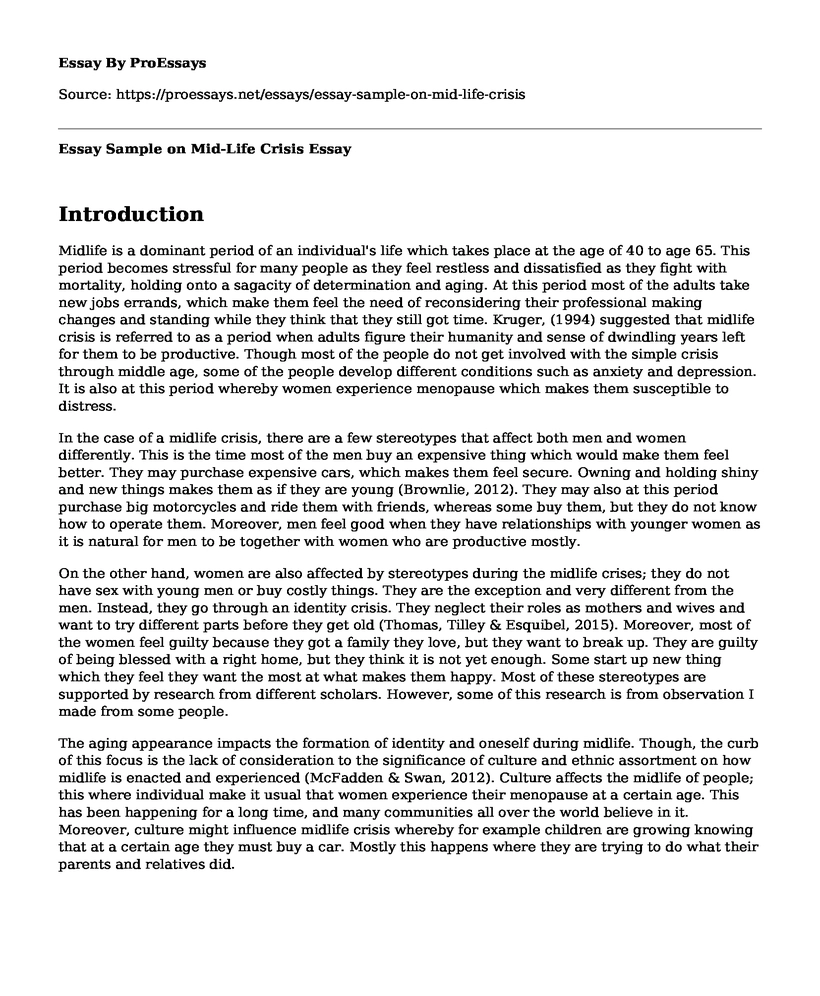Introduction
Midlife is a dominant period of an individual's life which takes place at the age of 40 to age 65. This period becomes stressful for many people as they feel restless and dissatisfied as they fight with mortality, holding onto a sagacity of determination and aging. At this period most of the adults take new jobs errands, which make them feel the need of reconsidering their professional making changes and standing while they think that they still got time. Kruger, (1994) suggested that midlife crisis is referred to as a period when adults figure their humanity and sense of dwindling years left for them to be productive. Though most of the people do not get involved with the simple crisis through middle age, some of the people develop different conditions such as anxiety and depression. It is also at this period whereby women experience menopause which makes them susceptible to distress.
In the case of a midlife crisis, there are a few stereotypes that affect both men and women differently. This is the time most of the men buy an expensive thing which would make them feel better. They may purchase expensive cars, which makes them feel secure. Owning and holding shiny and new things makes them as if they are young (Brownlie, 2012). They may also at this period purchase big motorcycles and ride them with friends, whereas some buy them, but they do not know how to operate them. Moreover, men feel good when they have relationships with younger women as it is natural for men to be together with women who are productive mostly.
On the other hand, women are also affected by stereotypes during the midlife crises; they do not have sex with young men or buy costly things. They are the exception and very different from the men. Instead, they go through an identity crisis. They neglect their roles as mothers and wives and want to try different parts before they get old (Thomas, Tilley & Esquibel, 2015). Moreover, most of the women feel guilty because they got a family they love, but they want to break up. They are guilty of being blessed with a right home, but they think it is not yet enough. Some start up new thing which they feel they want the most at what makes them happy. Most of these stereotypes are supported by research from different scholars. However, some of this research is from observation I made from some people.
The aging appearance impacts the formation of identity and oneself during midlife. Though, the curb of this focus is the lack of consideration to the significance of culture and ethnic assortment on how midlife is enacted and experienced (McFadden & Swan, 2012). Culture affects the midlife of people; this where individual make it usual that women experience their menopause at a certain age. This has been happening for a long time, and many communities all over the world believe in it. Moreover, culture might influence midlife crisis whereby for example children are growing knowing that at a certain age they must buy a car. Mostly this happens where they are trying to do what their parents and relatives did.
Conclusion
In the current era, people are most afraid of how they change in their physical appearance and not reminding them of their polarity. This is evident, whereby old people try to look young by using bleaching material. The aged people also take operation which renews their look into an excellent youthful look. Moreover, as people age they try to copy the behaviors and cultures of young people, they do not want to have the feeling of getting old.
References
Brownlie, J. (2012). Male suicide in mid-life: linking private troubles and large social processes. By Clare Wyllie, Stephen Platt, Julie Brownlie, Amy Chandler, Sheelah Connolly, Rhiannon Evans, Brendan Kennelly, Olivia Kirtley, Graham Moore, 91. Retrieved from https://www.researchgate.net/profile/Sheelah_Connolly/publication/271521903_Men_suicide_and_society_Why_disadvantaged_men_in_mid-life_die_by_suicide/links/54cb4ee20cf2517b75617d63.pdf#page=98
Kruger, A. (1994). The midlife transition: crisis or chimera?. Psychological reports, 75(3), 1299-1305. Retrieved from https://www.pcc.edu/staff/pdf/602/PSY215Chapter16PPT307.pdf
McFadden, J. R., & Rawson Swan, K. T. (2012). Women during midlife: Is it transition or crisis?. Family and Consumer Sciences Research Journal, 40(3), 313-325. Retrieved from https://onlinelibrary.wiley.com/doi/abs/10.1111/j.1552-3934.2011.02113.x
Thomas, L., Scott Tilley, D., & Esquibel, K. (2015). Sexual Assault: Where Are MidLife Women in the Research?. Perspectives in psychiatric care, 51(2), 86-97. Retrieved from https://onlinelibrary.wiley.com/doi/abs/10.1111/ppc.12067
Cite this page
Essay Sample on Mid-Life Crisis. (2022, Dec 19). Retrieved from https://proessays.net/essays/essay-sample-on-mid-life-crisis
If you are the original author of this essay and no longer wish to have it published on the ProEssays website, please click below to request its removal:
- Basic Tenets of Solution Based Therapy - Essay Sample
- Essay Sample on Knowledge Competencies as the Emphasis on Organizational Growth and Approach
- Occupational Health and Safety Administration Cites Missouri Plumbing Company - Essay Sample
- Research Paper on Organic Personality Disorder
- Essay Example on My Philosophy of Education: Creating Safe Learning Environments
- Essay Example on Amelie: A Story of Life, Love & Mise-en-Scene
- Free Essay on The Power of Determinism: How Our Choices Are Pre-Determined







